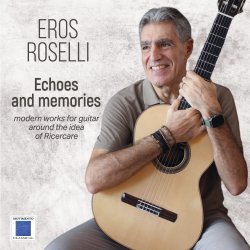
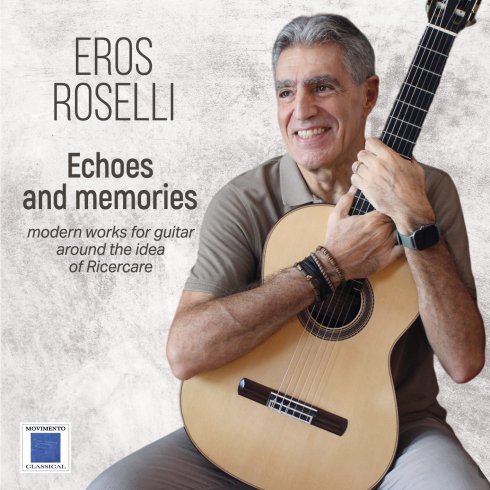
Echoes and Memories
Echoes and memories
modern works for guitar around the idea of Ricercare
The most notable absentee in this recording project is the 19th century repertoire. Apart from Bach Chaconne, the language that here finds space is what – with a generic but after all suitable definition – we can call as atonal. The precise hierarchy that regulates the succession and harmonic combination of the notes in the tonal system gives room for a desire for greater freedom which had already characterized the pre-classical period, with particular attention to the Renaissance and early 1600s modality. Furthermore, also for reasons linked to organological issues, that idea of freedom concerns the performance of the instrumental repertoire that reaches 1600, in particular the rhythm involved in a form of rubato which is very often out of place in the interpretation of the classical works.
Starting from the end of the 19th century, the will to rediscover the 16th and 17th century musical heritage and to use it as a source of inspiration spreads. It is not only thanks to the exponents of the so-called "generation of the eighties" (Casella, Malipiero, Pizzetti, Respighi...) that the vocal and instrumental production of those centuries was elected as a reference model for a new musical language, capable of extricating itself from the rubble of a now disintegrated tonal system and to appear as a convincing way out of the crisis affecting European music. Here then is the work of Ferenc Farkas who, reconciling modernity and tradition, looks both at the roots of the popular music of his nation (Hungary) and at the Italian instrumental patrimony. These Six pièces brèves are conceived as a single corpus, a sort of seventeenth-century Suite divided into movements of different rhythmic and formal character. For the titles of the six pieces Farkas draws not only from the Italian tradition but also from the Austro-Hungarian one. Then Hans Werner Henze who uses the term “tentos” to title a splendid triptych of short compositions included in the large and complex Kammermusik written in 1958. This term can be found for example in the works by Luys Milàn, the great Spanish vihuelist who lived in the 16th century, and indicates a musical form halfway between study and ricercare. It is really simple to ideally connect Henze's pieces to the monumental sixteenth-century vihuelistic repertoire, if we think about the form and a certain idea of sound. Having already been mentioned a few times, it seems right, at this point in the journey, to give voice to the Ricercare as originally intended by the exponents of the Italian lute tradition. Francesco da Milano is unanimously considered the most important of these lutists. Three of his Ricercari are here recorded, identified according to the numbering given by Ruggero Chiesa in the complete works for lute published in 1971 by Suvini Zerboni. The return to nowadays occurs with Nicola Jappelli, of whom the first of the three movements of Su echi di Mompou is played. Federico Mompou gifted to the guitar a wonderful Suite compostelana, in which mysticism, melancholy and sweetness dominate, expressed with a modal and atonal language that pushes us away from the present. Jappelli captures that character and offers a further and pertinent contribution to define the framework of this recording project. Another Ricercare is given to us by Matteo D'Amico: the modern language and the use of dissonances and sound effects make this composition, from a formal and expressive point of view, much closer to 16th century examples than it might appear at first listen. Virginio Zoccatelli's Five Pieces are inspired again by the ancient form of Ricercare for the melodic-polyphonic and contrapuntal matrix. Each piece presents particular timbral aspects and peculiar instrumental resources of the guitar, without neglecting the several rhythmic possibilities with single notes and chords, supported by the controlled virtuosity of the performer. The sound system used is neo-modal and polymodal. Frank Martin's Quatre pièces brèves are now considered an important work of the modern guitar repertoire. Also in this case the assembly of the four pieces takes the shape of a Suite. The Prelude is characterized by a monodic beginning followed by coherent rhythmic and dynamic developments. The Air is animated by a precious and repeated ornamentation in the style of the French harpsichord tradition. The Plainte is structured in expressive successions of chords that end with a re-enactment of the material exposed in the Prelude. Finally, with Comme une Gigue, the reference to the 17th century tradition becomes even more explicit. The conclusion of the route is entrusted to one of Bach's most famous instrumental compositions. To consider it eccentric with respect to the project as the "only tonal work" would be to confine it to common territory, humiliating its value and causing offense to the greatness of its author's genius. We could justify its presence by claiming the 16th century ancestry of the chaconne form, thus reestablishing the link with the rest of the program recorded here, but ultimately Johann Sebastian Bach's work does not need to be "justified". Wherever there is musical depth, in any era, Bach is necessarily there. In him we find the past and the future, tonality and non-tonality, harmony and counterpoint, asceticism and passion..

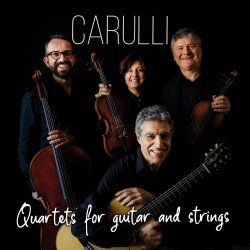
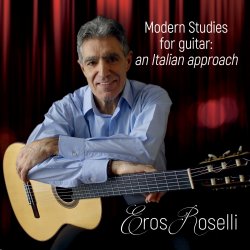
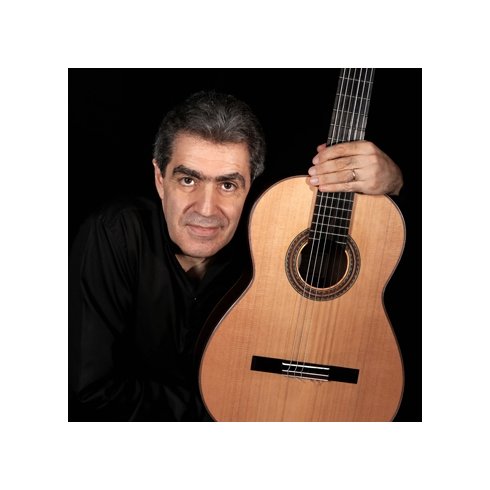
Eros Roselli
The guitarist Eros Roselli (promoter of the ensemble) studied with Ruggero Chiesa and won prizes and official acknowledgments at several competitions (Savona, Lagonegro, “F. Sor ”in Rome, Fundaciòn Guerrero in Madrid...). He has played a long series of concerts since 1985 and has held master classes in Italy, Switzerland, Germany, Austria, Spain, Croatia, Slovakia, Hungary, Lithuania, Russia, England, Denmark... American Record Guide wrote: “superb Italian guitarist Eros Roselli is a first-rate musician and he offers probing interpretations of even the most unassuming miniatures, employing his supple sense of phrasing, pristine articulation, and full tone to remarkably satisfying effect”.
Musician with multiple interests Eros Roselli has also been dedicating himself to composition for some years. Graduated in sociology at the University of Trento with a thesis on contemporary music, he is a guitar teacher at the Conservatory of Music in Padua. The experience gained in various institutional positions (including that of Director) led him to write a book on the reform of music conservatories titled “Exit from the ghetto?”, published in 2015 by Armando editore and a second work in 2018 entitled “Music and Conservatories”. Eros Roselli's activity is described in www.erosroselli.it.
